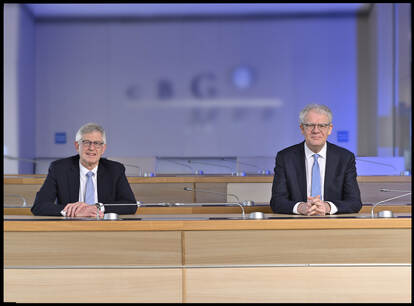Organisation
As an independent administrative body, the MEB wants to take decisions in a substantiated and transparent manner. That is why the MEB provides an opportunity, in relation to decisions, for an opinion to be submitted and for a hearing. It is also possible to object to a decision by the MEB and then to lodge a legal appeal.
Transparency, independence and integrity
Independence demands integrity. To ensure this the MEB has a Code of Conduct and an integrity policy. Board members, MEB employees and external experts fill in a ‘Conflict of Interest Declaration’. This takes place when employment commences or when entering into a contract, and then annually. New interests must be reported in the interim.
Based on the Code of Conduct and the integrity policy, in 2020, the MEBa’s Policy, Regulatory and International Affairs Unit (PRI) frequently issued advice about reported interests, ancillary activities and participation in events, seminars and collaborations. Some interests and activities are deemed to be incompatible with activities carried out for the MEB; other interests can lead to limitations being set for a Board Member or employee. These limitations mean that he or she may not be involved in certain activities or can only be involved to a limited extent.
Objection and appeal procedures
In 2020, there were again various objection and appeal procedures. These procedures could be divided roughly into two main categories: procedures in which decisions to renew or refuse a market authorisation were contested, and procedures about decisions to disclose information under the Public Access to Government Information Act (Wet openbaarheid bestuur, WOB). Competition interests of pharmaceutical companies play an important role in both types of procedures.
Objection and appeal procedures
Freedom of Information Act requests
The MEB received 56 requests under the Public Access to Government Information Act in 2020. In most cases, WOB requests are made by or on behalf of a competing pharmaceutical company. By far most of the requests concerned ongoing marketing authorisation applications at the MEB. The MEB also received more extensive requests, in which documents were requested (such as assessment reports). Documents that have been made available to the MEB often contain confidential information( for example, personal data or confidential commercial information). This confidential information has to be removed from the documents before these can be provided to the party who requested this information.
In 2020, a number of long-running legal proceedings on WOB requests came to an end. The manner in which information was made illegible by the MEB in documents requested under the WOB was deemed correct by the highest administrative court in three separate cases.
As a result of a change in the mandate in December 2019, the Medicines Evaluation Board agency will also handle WOB requests about veterinary medicines on behalf of the Ministry of Agriculture, Nature and Food Quality from 2020.
Freedom of Information Act requests
Opinion procedure
Before the MEB takes a decision on an application for a market authorisation, companies that have an interest in the matter (such as the requesting party) must be given the opportunity to give their opinion. In 2020, 26 companies made use of this opportunity. Of these 26 opinions, a hearing was organised at the request of a company in 6 cases. In the remaining cases, the opinion was submitted in writing. Because of the coronavirus pandemic, all hearings were conducted online via a video link rather than physically at the MEB office.
Hearings and opinion procedures
Quality management
The MEB has been ISO-9001 certificated since 2006. With this certificate, the MEB demonstrates that it meets this international quality management standard for the execution of its statutory tasks.
For the statutory tasks with regard to pharmacovigilance, the MEB is obliged to have a quality system in place by virtue of European regulations. Although, the regulation does not actually specify that external certification is obligatory, the MEB considers it important to operate in a transparent and verifiable manner. This promotes confidence. External certification provides additional assurance. The audit certification of 2020 shows that the MEB still meets the standard.
Complaints
22 complaints were received in 2020. Of these, 16 were well-founded, 3 were unfounded, 1 was partially founded and 2 were non-admissible. The well-founded complaints mainly concerned exceeding the statutory time limit.
After handling the complaint, the cause of each complaint is determined. During the annual and semi-annual complaints analysis, the cause is discussed with the head of the department to which the complaint pertained. The aim of this discussion is to identify trends and take suitable improvement measures to avoid repetition in the future.
Participation of all target groups
The Dutch Central Government and thus also the MEBa profile themselves as an attractive employer with a diverse range of positions. These positions must also be accessible for people with a disadvantage on the labour market. The statutory framework for this has been laid down in the Participation Act and the Jobs Quota (Work Disabled Persons) Act.
The MEB has made an extra effort in the past year to help people who experience a threshold when accessing the job market, for example due to an occupational disability. This is line with the MEB's ambition to be an inclusive employer, all employees should feel actively involved and accepted. In 2020, it was the MEB's aim to realise in total 12.4 FTEs in jobs for people with a disadvantage on the labour market. 11.5 FTEs were created in 2020. As the MEBa grows as an organisation, so does the number of jobs to be created for this target group. The number of FTEs envisioned is expected to be achieved by 2021.
Facts and figures
The MEB had an average of 408 employees in 2020, together accounting for an average of 374 FTEs. Nearly two-thirds of the MEB employees (65.7%) in 2020 were female, compared to 34.3% male. The average MEB employee is 44.6 years old, works with a part-time factor of 91.4% and has been in MEB's employment for 9 years.
Despite COVID-19, average absenteeism due to illness amounted to 1.4% for long-term absenteeism (ill for more than 42 days) and 1.2% for short-term absenteeism in 2020, comparable to 2019.
MEB-collegaues: percentage male and female
Organisational development
For the MEBa, the focus is on optimal performance of its statutory tasks; the assessment of medicines to determine whether they can be marketed, monitoring adverse reactions and risks, and encouraging proper use of medicines. In addition, the MEBa adds value to the national and international chain of organisations involved in the authorisation of medicines. This can be done by offering patients reliable, clear and easy-to-read information to encourage correct use of medicines, or by improving the notification centre for shortages for all stakeholders. We also participate in international initiatives to facilitate our work, for example by developing a medicine information database, for medicines for human use as well as veterinary medicines.
The performance of key tasks has come under pressure in recent years. On the one hand, this pressure is caused by growth of the organisation, complexity of procedures and an increase in activities besides the legal tasks, and on the other hand by pressure on the system of regulating medicines, technological developments and questions from society. Without letting go of our connection to the organisations around us, we had to focus on improving our own organisation in order to be well-equipped to perform our tasks now and in the future.
For the future design of the MEBa, the Board opted for a model with four divisions at the beginning of 2020. In the envisioned new model, the departments are grouped into four divisions; the four division managers and one managing director together form the senior management team.
Converting the current organisational structure to the divisional model requires a formal process with a number of phases, each with its own completion time.
Trailblazer structure
In anticipation of the divisional model, a Trailblazer structure (KMO) was established in October 2020. The QMO is headed by the managing director, the deputy director with the role of Trailblazer of the Staff Division, and 3 quartermasters of other divisions. The managing director is responsible for the management team as a whole and for the individual management of the quartermasters.
The purpose of setting up this temporary organisational form is to gain experience with and discover how best to organise the envisioned divisional structure without making any irreversible decisions.
Works Council
The elections for the Works Council took place in 2020. The new Works Council started in spring 2020 with the maximum number of nine members.
2020 was a tumultuous year for the MEBa staff. Like many other organisations, the agency suffered from Citrix issues early in the year, which temporarily limited our work options. Shortly afterwards, the whole of the Netherlands was confronted with COVID-19. As well as impacting the agency’s staff, and sometimes their ability to work their regular hours, this also led to more work on the availability of potential medicines and later vaccines for COVID-19.
In addition to the impact of COVID-19 on agency staff, workload has also been an important theme for the Works Council for some time. Various studies, including those conducted in cooperation with trade union FNV, show that the average workload among employees is very high. The Works Council is committed to making the workload transparent and taking actions to reduce it.
In 2020, the Works Council’s agenda also included topics such as the agency’s organisational development process and the upcoming relocation and communication on both matters.
Information provision
From working from home occasionally to working from home on a structural basis
The COVID-19 pandemic has disrupted not only social life, but also working life. The advice to “work from home as much as possible” has had an impact on the organisation. And that certainly applies to the Information Provision Unit as well: great demands have been placed on the people and resources that support it.
The top priority was to ensure the MEB’s business continuity. Although working from home was already well-established in the organisation, this new reality called for additional measures. These included strengthening the network, implementing Webex video conferencing, focusing on assisting MEB staff in issues related to information provision both online and through service at home.
2020 was also marked by the creation of the new workspace for all MEB staff. The new workspace has provided flexibility to better support the workplace (at home or elsewhere). The added value included video calling, working offline, the upgrade of the Office suite and a higher and more stable version of Windows 10.
Outsourcing ICT infrastructure
In 2018, MEB concluded that much of the existing ICT infrastructure was outdated and that the hardware needed to be replaced urgently. The choice was then made to outsource the ICT infrastructure. This project was further implemented in 2019 by formulating a sourcing strategy, launching a tender and completing the 2019 specifications. The year 2020 was marked by the actual migration of the MEB’s ICT infrastructure to a government data centre and a new ICT services provider Solvinity. The migration was successfully completed in December 2020. While the transition is itself a complex process, it was complicated even more by the fact that many MEB staff had to work through the weekend of the migration because of COVID-19 vaccine assessments.
Establishment of Information Provision Portfolio Board
In order to meet the challenges of information provision as an organisation, the decision was made to establish an Information Provision Portfolio Board in 2020. The Information Provision Portfolio Board provides guidance for the information provision portfolio. The information provision portfolio is a deliberately chosen, cyclically changing set of activities, projects and programmes. The information provision portfolio includes requirements, wishes and needs of the MEB user organisation. The Information Provision Portfolio Board continuously weighs ongoing and new information provision initiatives with regard to priority and available capacity. The Portfolio Board makes decisions concerning these initiatives. With the establishment of the Information Provision Portfolio Board, the MEB is taking a new step in professionalising the commissioning and realisation of information projects in partnership with the MEB user organisation.
Information security and privacy
Information security and privacy received both wanted and unwanted attention in 2020. In January 2020, the MEB was confronted with a leak in the Citrix Netscalers. This made the usefulness and necessity of timely systems patching painfully clear. Working from home on a structural basis brought a new dimension to the concept of awareness in 2020. The plans made in the first few months of the year regarding awareness were largely put on hold. The decision was made to publish targeted news reports instead. The first reports were focused on working safely from home, and later reports focused on the increased amount of phishing and spear-phishing emails.
European cooperation on information provision
An important project in the area of information provision is the implementation of EU-SRS, a European database in which substances used in medicines are given unique and scientifically sound descriptions.
Following a Proof of Concept (in 2019), the MEB received approval from the Heads of Medicines Agencies (HMA) to implement the EU-SRS system. The project is being funded partially by a grant from the European Commission. The project is currently in progress and will run until 2022, at which point the EU-SRS system will be transferred to the EMA. The database will contribute to patient safety in Europe. At the end of 2020, as part of the project, a collaboration between the US Food & Drug Administration (FDA), the World Health Organization (WHO), and the EU-SRS team was launched to establish global agreements on how vaccines are characterised. This is a first step and a trial to investigate whether ‘global substance management’ is feasible.








